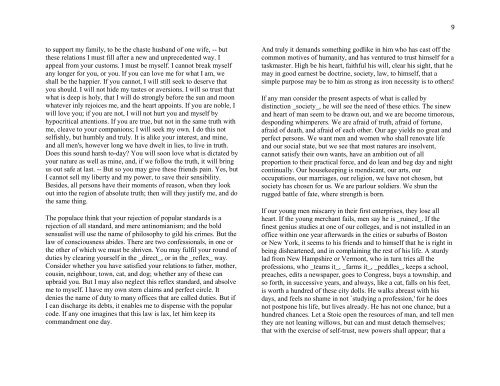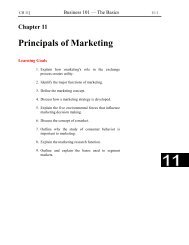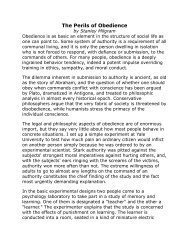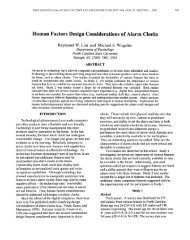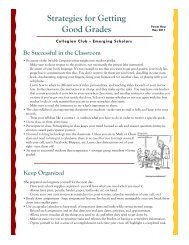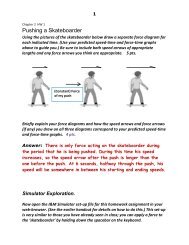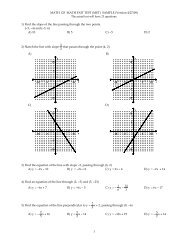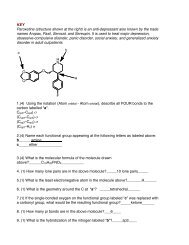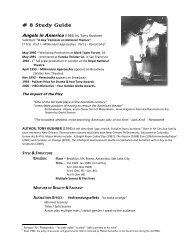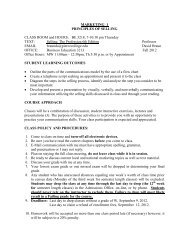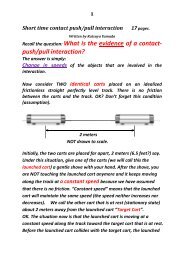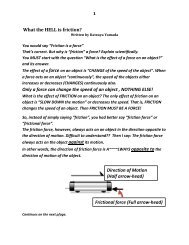Self-Reliance - Faculty.piercecollege.edu
Self-Reliance - Faculty.piercecollege.edu
Self-Reliance - Faculty.piercecollege.edu
Create successful ePaper yourself
Turn your PDF publications into a flip-book with our unique Google optimized e-Paper software.
to support my family, to be the chaste husband of one wife, -- but<br />
these relations I must fill after a new and unprecedented way. I<br />
appeal from your customs. I must be myself. I cannot break myself<br />
any longer for you, or you. If you can love me for what I am, we<br />
shall be the happier. If you cannot, I will still seek to deserve that<br />
you should. I will not hide my tastes or aversions. I will so trust that<br />
what is deep is holy, that I will do strongly before the sun and moon<br />
whatever inly rejoices me, and the heart appoints. If you are noble, I<br />
will love you; if you are not, I will not hurt you and myself by<br />
hypocritical attentions. If you are true, but not in the same truth with<br />
me, cleave to your companions; I will seek my own. I do this not<br />
selfishly, but humbly and truly. It is alike your interest, and mine,<br />
and all men's, however long we have dwelt in lies, to live in truth.<br />
Does this sound harsh to-day? You will soon love what is dictated by<br />
your nature as well as mine, and, if we follow the truth, it will bring<br />
us out safe at last. -- But so you may give these friends pain. Yes, but<br />
I cannot sell my liberty and my power, to save their sensibility.<br />
Besides, all persons have their moments of reason, when they look<br />
out into the region of absolute truth; then will they justify me, and do<br />
the same thing.<br />
The populace think that your rejection of popular standards is a<br />
rejection of all standard, and mere antinomianism; and the bold<br />
sensualist will use the name of philosophy to gild his crimes. But the<br />
law of consciousness abides. There are two confessionals, in one or<br />
the other of which we must be shriven. You may fulfil your round of<br />
duties by clearing yourself in the _direct_, or in the _reflex_ way.<br />
Consider whether you have satisfied your relations to father, mother,<br />
cousin, neighbour, town, cat, and dog; whether any of these can<br />
upbraid you. But I may also neglect this reflex standard, and absolve<br />
me to myself. I have my own stern claims and perfect circle. It<br />
denies the name of duty to many offices that are called duties. But if<br />
I can discharge its debts, it enables me to dispense with the popular<br />
code. If any one imagines that this law is lax, let him keep its<br />
commandment one day.<br />
And truly it demands something godlike in him who has cast off the<br />
common motives of humanity, and has ventured to trust himself for a<br />
taskmaster. High be his heart, faithful his will, clear his sight, that he<br />
may in good earnest be doctrine, society, law, to himself, that a<br />
simple purpose may be to him as strong as iron necessity is to others!<br />
If any man consider the present aspects of what is called by<br />
distinction _society_, he will see the need of these ethics. The sinew<br />
and heart of man seem to be drawn out, and we are become timorous,<br />
desponding whimperers. We are afraid of truth, afraid of fortune,<br />
afraid of death, and afraid of each other. Our age yields no great and<br />
perfect persons. We want men and women who shall renovate life<br />
and our social state, but we see that most natures are insolvent,<br />
cannot satisfy their own wants, have an ambition out of all<br />
proportion to their practical force, and do lean and beg day and night<br />
continually. Our housekeeping is mendicant, our arts, our<br />
occupations, our marriages, our religion, we have not chosen, but<br />
society has chosen for us. We are parlour soldiers. We shun the<br />
rugged battle of fate, where strength is born.<br />
If our young men miscarry in their first enterprises, they lose all<br />
heart. If the young merchant fails, men say he is _ruined_. If the<br />
finest genius studies at one of our colleges, and is not installed in an<br />
office within one year afterwards in the cities or suburbs of Boston<br />
or New York, it seems to his friends and to himself that he is right in<br />
being disheartened, and in complaining the rest of his life. A sturdy<br />
lad from New Hampshire or Vermont, who in turn tries all the<br />
professions, who _teams it_, _farms it_, _peddles_, keeps a school,<br />
preaches, edits a newspaper, goes to Congress, buys a township, and<br />
so forth, in successive years, and always, like a cat, falls on his feet,<br />
is worth a hundred of these city dolls. He walks abreast with his<br />
days, and feels no shame in not `studying a profession,' for he does<br />
not postpone his life, but lives already. He has not one chance, but a<br />
hundred chances. Let a Stoic open the resources of man, and tell men<br />
they are not leaning willows, but can and must detach themselves;<br />
that with the exercise of self-trust, new powers shall appear; that a<br />
9


